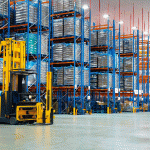The past two years have put immense pressure on supply chains across the globe. Ongoing geopolitical uncertainties coupled with the lingering impact of the pandemic and Brexit, as well as soaring inflation and the cost-of-living crisis – all of which combined are causing major supply chain disruption. As the EU resorts to emergency powers this September to alleviate this unprecedented strain, it further highlights the vulnerabilities that many organisations need to address in order to effectively navigate through supply-side uncertainties and swiftly adapt to changing circumstances and mitigate risk.
Building supply chain resilience and enabling agile planning are now the paramount priority for businesses to adapt to socio-economic and geopolitical pressures, ensure customer satisfaction and be better positioned for sustainable growth. Embracing technologies such as data analytics and AI at every point along the value chain is the first step to achieving a holistic ecosystem to automatically react to challenges with real-time visibility, predictive planning and rapid response models.
Enabling real-time visibility and streamlined management
As volatility arises from both the supply and demand side, it has never been more important for businesses to gain a complete view of their entire supply chain, connecting all factors end-to-end in order to meet shifting trends and consumer demands.
One of the most fundamental challenges businesses need to overcome to achieve a truly adaptable supply chain is enabling visibility and end-to-end transparency. In the new world of hybrid work and e-commerce, supply chain managers need to move away from relying on historic patterns of consumer behaviour and gradually towards an informed and data-enabled investigative model where real-time insights and visibility drive the supply side decisions. Investing in a modern supply chain management system that is able to connect and consolidate disparate data points across multiple systems and sources can be transformational. Once implemented, organisations will be able to gain a single viewpoint of every factor along their supply chain and customer demand from order fulfilment, planning, procurement, production, stock, warehousing and transportation to customer journey touchpoints and online queries – enabling real-time visibility and a streamlined management process at a time of uncertainties.
Accelerating data-driven planning and supply chain agility
Harnessing digital solutions, moving away from the over-reliance on legacy systems and breaking down data silos can also promote companies’ efficiency of data utilisation. This is crucial to accelerating intelligent decision-making, agile planning and mitigating risk. By enabling all stakeholders – from suppliers to partners to customers – to share information and collaborate in real time, supply chain managers are provided with access to detailed data sources. Coupled with AI-powered data analytics, companies can unearth hidden insights buried in supply chain operations to mitigate risk and drive operational efficiency.
By enriching the supply chain management system with real-time data analytics, companies are better positioned to adapt to the volatile market, pinpoint obstacles to mitigate growing risks and operational complexities. Organisations can also implement AI-enriched demand forecasting tools to optimise operations and achieve real-time, priority-based inventory planning. Such technologies can be transformational as they offer a way for companies to move from reactive to proactive operations and ultimately maximise operational efficiency, product quality and profitability.
Future proofing scalability and sustainable growth
Achieving true agility in the supply chain means that companies not only need to quickly bounce back from existing disruptions but also ensure their operations are scalable and flexible and, more importantly, are in line with sustainable requirements. Investing in technologies can give back in multitudes, as it not only ensures complete supply chain visibility and highly-level data access that will allow organisations to minimise supply chain disruptions, but it also enables the companies to understand their growth patterns. This will allow organisation to maximise every growth opportunity and scale up to meet consumer demands. Done well, organisations can also extract insights from the holistic view of their supply chain to assess carbon emissions and build programs and initiatives accordingly to achieve their sustainability goals.
Having an adaptable, intelligent and resilient supply chain is crucial for any organisation, now more than ever. Ultimately, ensuring your business is armed with the necessary tools to weather whatever challenges or opportunities that may arise is the key to future-proofing its success. By investing in digital technologies, moving from legacy systems to an interconnected supply chain management system and utilising AI-powered data analytics, businesses are investing in their ability to become truly agile and be ready for future growth.







